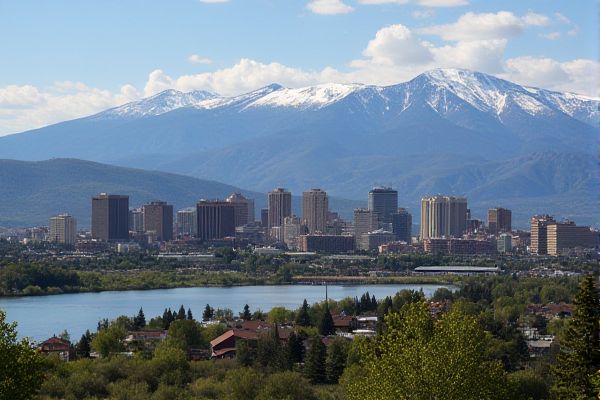
Cost of living in Colorado: Housing costs vary by city. Transportation expenses higher than average. Increased healthcare costs compared nationally. Higher-than-average utility costs. Groceries cost slightly above national average. Recreational activities often costly. Dining out typically pricy. State sales tax is 2.9%. Educational expenses vary widely. Professional salaries relatively competitive.
Housing costs vary by city.
Housing costs in Colorado vary significantly by city, with cities like La Junta and Lamar offering median home values as low as $162,619 and $175,085, respectively, while cities like Grand Junction and Pueblo have median home values of $402,274 and $291,787. Rental prices also vary, ranging from $1,000 in La Junta to $1,700 in Grand Junction.
Transportation expenses higher than average.
In Colorado, transportation expenses are notably higher than average, with residents who own a vehicle expecting to pay around $657 per month, which includes costs for gas, maintenance, repairs, and express tolls. Even public transportation users find themselves spending between $114-$200 monthly. Additionally, the state's spread-out nature means residents spend about 6 percent more than the national average on transportation-related costs, with annual estimates for a single adult being around $9,667. For more detailed information on these expenses, you can visit the Cost of Living in Colorado page.
Increased healthcare costs compared nationally.
Colorado's healthcare costs are significantly higher than the national average, with total costs elevated by 17% across all services and particularly pronounced for outpatient services, which are 30% higher, and pharmacy services, 24% higher. These increases are driven by both greater utilization and elevated pricing. Furthermore, Colorado's hospital prices and costs rank among the nation's highest, with prices increasing at a rate that surpasses the national average. For more insights into this issue, you can explore the study identifying the drivers of these high healthcare costs compared to other states.
Higher-than-average utility costs.
Despite some sources suggesting that utility costs in Colorado are generally lower than the national average, specific contexts, such as the need for heating in cold winters, can drive up costs. For a 915 sq ft apartment, the average monthly utility cost, including internet, is $261.06, with basic utilities (electricity, heating, cooling, water, garbage) averaging $183.72. More details about these utilities can be found on the Movingwaldo website, which provides comprehensive insights into living costs across different areas.
Groceries cost slightly above national average.
In Colorado, the average weekly grocery cost is $279.98, which is slightly above the national average of $270.21. This places Colorado as the 9th highest in the nation for grocery prices. For more detailed insights on groceries and economic trends, visit Kunr where you can explore the underlying factors contributing to these high costs in the Mountain West region.
Recreational activities often costly.
In Colorado, recreational activities are a significant component of the cost of living, with outdoor recreationists spending over $52.1 billion on trips and equipment in 2023, contributing to a total economic output of $65.8 billion and supporting a large segment of the state's economy and workforce. This high level of spending reflects the state's robust outdoor recreation sector, which includes activities such as hiking, boating, hunting, and skiing, and is a major driver of economic activity in the state. For more in-depth information about this sector, visit the comprehensive report from Colorado Parks and Wildlife, which highlights the ongoing efforts and developments in outdoor recreation across Colorado.
Dining out typically pricy.
Dining out in Colorado has become significantly more expensive, with menu prices increasing by nearly 25% since November 2022, raising the average meal cost from $91 to $112 by June 2023, making Colorado the state with the highest restaurant inflation in the country.
State sales tax is 2.9%.
In Colorado, the state sales tax rate is 2.9%, but the total sales tax can vary significantly depending on local and special district taxes. These additional taxes can range from 0% to 8.3% in addition to the state rate, resulting in a combined rate of up to 11.2% in some areas. For more detailed information on how these rates are applied, consider visiting the Levy Company website.
Educational expenses vary widely.
Educational expenses in Colorado vary widely, with average tuition and fees ranging from $7,693 for in-state students to $21,299 for out-of-state students, and significant variations among different institutions. From public colleges like Colorado Mountain College at $12,540 to private universities like Colorado College at $67,932, the financial landscape for higher education can be considerably different based on the educational path chosen. For a detailed overview of tuition costs and comparisons among various institutions, visit the College Evaluator website to learn more about these variations in Colorado.
Professional salaries relatively competitive.
In Colorado, while the overall cost of living is 6% higher than the national average, professional salaries can be relatively competitive, especially in fields like management, computer and mathematical occupations, and healthcare practitioners, which offer salaries ranging from $88,330 to $149,300 annually, according to various sources. However, these salaries must be considered in the context of the higher housing and other living costs in the state. For more details on the cost of living in Colorado, the Cost of Living Calculator provides essential insights into how various expenses compare within the region.
